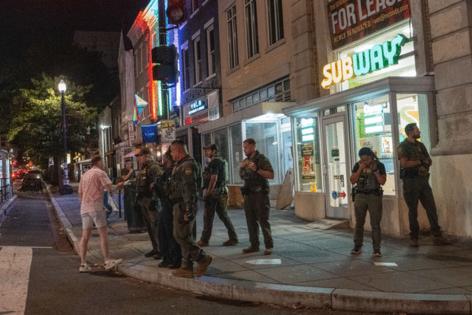David M. Drucker: Crime stats aren't the best way to make people feel safe
Published in Op Eds
On an evening in late July, just blocks from the Washington, DC, rowhouse my wife and I share with our two boys, a shootout erupted between two groups of people. Injuries resulted; cars and homes were riddled with bullets and police determined more than 140 shots were fired.
With criminal activity like this still a daily fact of life in the nation’s capital — and with Americans nationwide often uneasy about their families’ public safety — Democrats are playing political Russian roulette by citing encouraging crime statistics to declare President Donald Trump’s takeover of DC’s Metropolitan Police Department wholly unnecessary.
The same goes for his flooding of the city streets with National Guard troops and federal law enforcement. A not-insignificant portion of the electorate in crucial 2026 midterm election battlegrounds might conclude that at least Trump is doing something and acting within the law.
Yes, statistics prove crime is dropping, these same voters might acknowledge. But if conditions haven’t improved sufficiently to assuage voters’ concerns — if they feel unsafe — then citing crime stats to insist nothing at all needs doing is liable to push voters toward Trump, however imperfect his solution to the problem.
Similarly, just because FBI statistics released earlier this month showed the rate of murders, rapes, aggravated assaults and robberies dropping across the U.S., that doesn’t mean that they reached levels voters find acceptable. It’s not unlike the political risk of arguing to voters anxious about paying their bills that the economy is fine because the stock market is booming, unemployment is at historic lows and statistics show inflation is slowing.
“You never win in politics by telling people something’s not a problem when they feel it is. Democrats have long had a trust deficit on crime and public safety, and voters start by being skeptical that they are willing to hold criminals accountable. Trump is well aware of this vulnerability and is masterful at exploiting it,” said Lanae Erickson, vice president for social policy, education and politics at Third Way, a centrist Democratic think tank in Washington.
I live on Capitol Hill and will have been here 20 years later this month. My wife has called the Hill home even longer. If we felt the neighborhood was prohibitively unsafe for our family, we would have followed many of our friends to the suburbs.
Over the past roughly 18 months, we have felt safer than during the crime spike that occurred at the height of the COVID-19 pandemic and the two years-plus that followed, when DC was plagued by carjackings and other violent crime. Year-over-year stats compiled by the Metropolitan Police Department showing violent crime down 26% year-to-date would appear to fit our experience. (Some DC police officers are accusing the department of falsifying statistics, although FBI tracking seems to confirm the city’s official numbers.)
But a Washington Post-Schar School poll, conducted this past spring, suggests that many residents are still waiting for the district to feel as safe as it did before the pandemic — when affordable housing, not crime, topped their concerns.
As Democratic DC Councilman Charles Allen conceded in an email to constituents denouncing Trump’s law enforcement action in Washington, “If a crime happened to you, someone you love, or on your block, all the stats in the world are meaningless.”
Trump on August 11 announced he was invoking the Home Rule Act of 1973 granting DC limited self-governance to assume command of the Metropolitan Police Department and deploy the National Guard and various federal law enforcement agencies to the city. The president suggested he might do the same elsewhere, although the legal basis for expanding these actions beyond Washington is questionable and carries some political peril.
“People believe their own feelings more than government statistics,” said Alex Conant, a Republican operative and cofounder of the Washington public relations firm, Firehouse Strategies. “Both sides risk overplaying their hands. But Trump has the advantage here.” Still, as a matter of pure, crass politics, Democrats are not in some box canyon requiring them to rubber-stamp Trump’s policy in Washington or approach to crime generally.
As Democratic strategist Dane Strother told me late last week, his party has strategic options for opposing Trump’s “theatrics.” His advice: validate voters’ insecurities, offer compelling explanations for why the president’s strategy is counterproductive and propose concrete alternatives. “Democrats must publicly support cracking down on crime — and who wouldn’t,” said Strother, who when not in DC spends time in California and Montana.
The bottom line is that Trump isn’t politically invulnerable.
His average job approval rating is a middling 45.5% and per the most recent YouGov survey for The Economist, voters rate his handling of crime about the same: 45%. With Trump’s penchant for stretching executive authority beyond the Constitution’s intent, and his excessive declarations of national emergencies putting many Americans on edge, those mediocre numbers suggest voters will listen to strong arguments that there are more effective ways to reduce crime and improve their quality of life.
Of course, those arguments must first be made.
_____
This column reflects the personal views of the author and does not necessarily reflect the opinion of the editorial board or Bloomberg LP and its owners.
David M. Drucker is columnist covering politics and policy. He is also a senior writer for The Dispatch and the author of "In Trump's Shadow: The Battle for 2024 and the Future of the GOP."
_____
©2025 Bloomberg L.P. Visit bloomberg.com/opinion. Distributed by Tribune Content Agency, LLC.
























































Comments